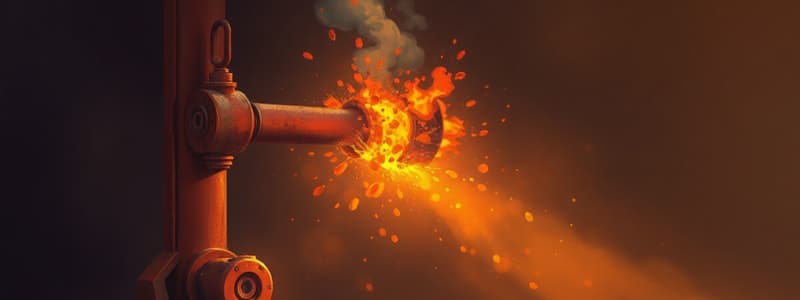Podcast
Questions and Answers
What is the initial process that leads to the oxidation of iron during rusting?
What is the initial process that leads to the oxidation of iron during rusting?
- Hydration of ferric oxide
- Ferrous hydroxide formation
- Electrons being lost from iron (correct)
- Reduction of oxygen
Which ions are produced during the anode reaction of rusting?
Which ions are produced during the anode reaction of rusting?
- Ferrous ions (Fe²⁺) (correct)
- Hydroxide ions (OH⁻)
- Ferric ions (Fe³⁺)
- Zinc ions (Zn²⁺)
What do ferrous ions (Fe²⁺) react with to form ferrous hydroxide (Fe(OH)₂)?
What do ferrous ions (Fe²⁺) react with to form ferrous hydroxide (Fe(OH)₂)?
- Hydroxide ions (OH⁻) (correct)
- Ferric ions (Fe³⁺)
- Oxygen (O₂)
- Water (H₂O)
In the process of rusting, which compound is formed as a result of the oxidation of ferrous hydroxide?
In the process of rusting, which compound is formed as a result of the oxidation of ferrous hydroxide?
Which of the following methods is NOT commonly used to prevent rusting?
Which of the following methods is NOT commonly used to prevent rusting?
What role does zinc play in galvanization?
What role does zinc play in galvanization?
How can controlling the environment assist in rust prevention?
How can controlling the environment assist in rust prevention?
What is one way that cathodic protection is implemented?
What is one way that cathodic protection is implemented?
What is the final product of the rusting process in its most common form?
What is the final product of the rusting process in its most common form?
Which step in the rusting process involves the reduction of oxygen?
Which step in the rusting process involves the reduction of oxygen?
Rust is primarily formed from the dehydration of ferric hydroxide (Fe(OH)₃).
Rust is primarily formed from the dehydration of ferric hydroxide (Fe(OH)₃).
Galvanization involves coating iron with a layer of stainless steel to prevent rust.
Galvanization involves coating iron with a layer of stainless steel to prevent rust.
The process of rusting requires the presence of both water and oxygen.
The process of rusting requires the presence of both water and oxygen.
Ferrous hydroxide (Fe(OH)₂) is produced when oxygen is oxidized in the rusting process.
Ferrous hydroxide (Fe(OH)₂) is produced when oxygen is oxidized in the rusting process.
Alloying iron with chromium can enhance its resistance to rusting.
Alloying iron with chromium can enhance its resistance to rusting.
Flashcards are hidden until you start studying
Study Notes
Rusting: An Electrochemical Process
-
Rusting is a form of corrosion specific to iron. It occurs when iron reacts with oxygen and water.
-
Key Reactions:
- At the anode, iron (Fe) loses electrons and becomes ferrous ions (Fe²⁺).
- At the cathode, oxygen (O₂) in the presence of water gains electrons and forms hydroxide ions (OH⁻).
- Ferrous ions (Fe²⁺) react with hydroxide ions (OH⁻) to produce ferrous hydroxide (Fe(OH)₂).
- Ferrous hydroxide is oxidized by oxygen to form ferric hydroxide (Fe(OH)₃), also known as yellow rust.
- Ferric hydroxide dehydrates to form hydrated ferric oxide (Fe₂O₃·nH₂O), which is the familiar reddish-brown rust.
Prevention Strategies
-
Protective Coatings:
- Painting: Acts as a barrier, preventing oxygen and water contact.
- Galvanization: Applying zinc coating, which corrodes instead of the iron (sacrificial anode).
- Tin Plating: Coating with tin for protection, commonly used in food cans.
- Powder Coating: Dry powder cured by heat, providing a protective layer.
- Alloying: Combining iron with other metals to improve rust resistance, such as stainless steel (chromium).
-
Cathodic Protection:
- Connecting iron to a more reactive metal (zinc or magnesium) makes the iron the cathode, inhibiting corrosion.
- Commonly used for pipelines and ships.
-
Environment Control:
- Keeping iron dry: Store in dry places to minimize moisture exposure.
- Using dehumidifiers: Reduces air moisture in humid environments.
- Removing salts: Salts accelerate rusting.
Rusting Mechanism
- Rusting is the electrochemical oxidation of iron, forming its oxide (reddish-brown flaky substance)
- Rusting requires water and oxygen
- Anode Reaction: Iron loses electrons to form ferrous ions (Fe²⁺)
- Cathode Reaction: Oxygen in water gains electrons to form hydroxide ions (OH⁻)
- Ferrous Hydroxide Formation: Ferrous ions react with hydroxide ions to form ferrous hydroxide (Fe(OH)₂)
- Ferric Hydroxide Formation: Ferrous hydroxide is further oxidized by oxygen to form ferric hydroxide (Fe(OH)₃), also known as yellow rust
- Rust Formation: Ferric hydroxide dehydrates to form hydrated ferric oxide (Fe₂O₃·nH₂O), which is the familiar reddish-brown rust
Preventing Rusting
- Protective Coatings:
- Painting: A simple and effective barrier
- Galvanization: Coating iron with zinc, which acts as a sacrificial anode
- Tin Plating: Coating iron with tin, often used for food cans
- Powder Coating: Applying a heated powder that forms a protective layer
- Alloying: Mixing iron with other metals to improve its resistance, like stainless steel (containing chromium)
- Cathodic Protection: Connecting iron to a more reactive metal to prevent iron from corroding (often used for pipelines and ships)
- Controlling Environment:
- Keep iron dry
- Use dehumidifiers to reduce moisture
- Remove salts, which accelerate rusting
Studying That Suits You
Use AI to generate personalized quizzes and flashcards to suit your learning preferences.


